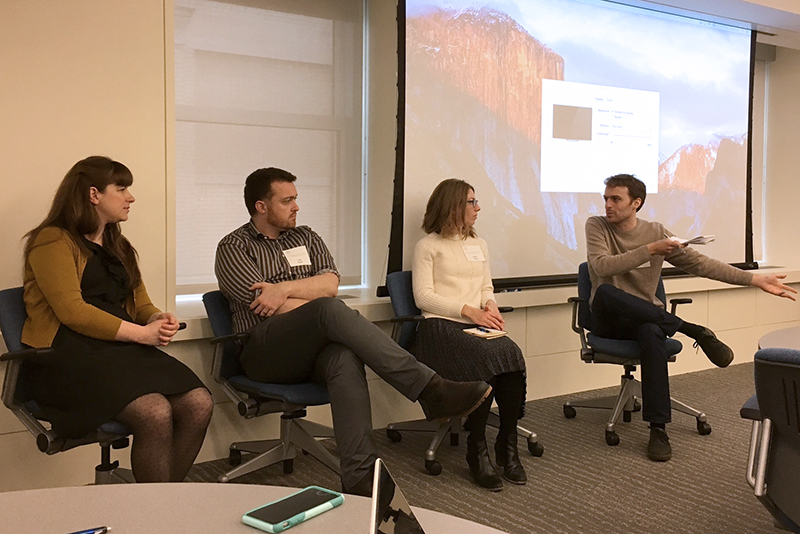Stop Making Sense: Sensory Science Meets STS
 "Allison Brown (Penn State), Luke Stark (Dartmouth), Sarah Tracy (UCLA), Alexios Tsigkas (New School) field questions at the Stop Making Sense Symposium."
"Allison Brown (Penn State), Luke Stark (Dartmouth), Sarah Tracy (UCLA), Alexios Tsigkas (New School) field questions at the Stop Making Sense Symposium."
April 6, 2017
Drexel’s STS Center, in conjunction with the Chemical Heritage Foundation and Drexel’s Center for Hospitality and Sports Management, co-hosted a one-day symposium on March 10, 2017, “Stop Making Sense”. The symposium was co-organized by Jacob Lahne, PhD, assistant professor in culinary arts and food science at Drexel and affiliate faculty member with STS; Nick Shapiro, PhD, the Matter, Materials and Culture Fellow at the Chemical Heritage Foundation; and Christy Spackman, PhD, Hixon-Riggs Early Career Fellow at Harvey Mudd College; and benefited from the creative production assistance STS graduate student Kristy Birchard ’17. Over 60 people attended, traveling from institutions across the U.S., and Europe.
“Stop Making Sense” brought together social scientists, humanists and sensory scientists for a multi-disciplinary conversation about the processes and practices of making scientific knowledge out of individual sensory experiences with food. Reflecting the turn in STS scholarship that seeks to bridge the gap between STS insights and current sensory science practice, the symposium explicitly juxtaposed different modes of understanding to explore the strengths and challenges of sensory science.
Keynote Speakers:
- Hildegaard Heymann, PhD, distinguished professor in the department of viticulture and enology at the University of California-Davis
- Steven Shapin, PhD, the Franklin L. Ford research professor of the history of science at Harvard University.
Throughout the symposium, participants wrestled with the history of current mass food production systems (e.g., how did the orange come to be orange?) and how sensory engagements of different types can support alternative systems of food production. Rikke Højer (doctoral candidate at the Nordic Food Lab, University of Copenhagen), one of the presenters, demonstrated a hands on fish printing activity that she uses in schools in Denmark to encourage students to move past initial discomfort with fish as a food.